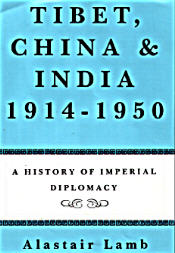
ISBN 0 90129 03 X 1989.594 pages,11maps,234mmx156mm.
cloth,price £50 plus postage £3.50
This book completes a narrative which the
author began in Britain and Chinese Central Asia: the Road to
Lhasa 1767 to 1905 (first published in 1960 and revised in 1986
as British India and Tibet 1766-1910), and continued in The
McMahon Line (2 vols., 1966). It takes the story from 1914 up to
the end of the British period in India in 1947 with a postscript
relating to the first stages of the Chinese Communist
"liberation" of Tibet.
Like the previous volumes, Tibet, China and
India 1914-1 95 0 is based to a great extent on British
archival material. It provides by far the most detailed account
so far available of British policy towards Tibet during the final
three decades or so of the British Indian Empire. It also throws
a great deal of light both on the internal history of Tibet
during this period and on the pattern of relations between Tibet
and China.
Among topics covered are: British missions to
Lhasa by Bell, Bailey, Weir, Williamson, Gould and Hopkinson;
Sino-Tibetan conflict in Kham, including the crises of 1917-18
and 1930-33; Indo-Tibetan. border problems such as the Dopko
Karpo question on the Tibet-Ladakh border and the Middle Sector
Terhi-Garhwal dispute; the history of the McMahon Line from 1914
until the British departure from India and the genesis of NEFA;
British views on the status of Tibet including the EdenSoong
exchanges of 1943; the nature of British arms supply to Tibet;
the effect of the Transfer of Power on Anglo-Tibetan relations.